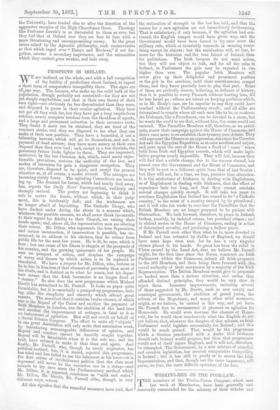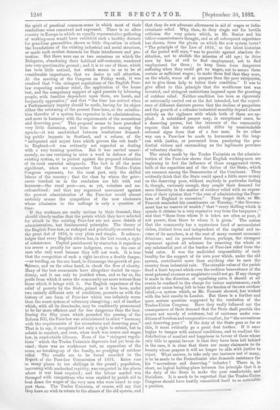WORKING-MEN ON THE POOR-LAW. T HE members of the Trades-Union Congress,
which met last week at Manchester, have been generally and deservedly commended for the sobriety of their debates and
the spirit of practical common-sense in which most of their resolutions were conceived and expressed. There is no other country in Europe in which an equally representative gathering of working-men would have exhibited such a healthy distaste for grandiose generalities, shown so little disposition to attack the foundations of the existing industrial and social structure, or made such modest demands for State interference and pro- tection. But there were one or two occasions on which the Delegates, abandoning their habitual self-restraint, wandered into very questionable ground ; and it is to one of these, which has been little noticed, but which seems to us to be of considerable importance, that we desire to call attention. At the meeting of the Congress on Friday week, it was resolved that "the stringent regulations of the English Poor- law respecting outdoor relief, the application of the house test, and the compulsory support of aged parents by labouring people, with families dependent upon them, are harsh, and frequently oppressive ;" and that "the time has arrived when a Parliamentary inquiry should be made, having for its object either the reforming of the present Poor-laws, or the substitu- tion therefor of a system less expensive in its administration, and more in harmony with the requirements of the necessitous and deserving poor," This proposal seems to have provoked very little discussion, and from its position among the agenda—it was sandwiched between resolutions demand- ing public inquests in Scotland, and a reform of the "antiquated and unjust laws which govern the cab trade" in England—it was evidently not regarded as dealing with a very burning question. But it was carried unani- mously, no one venturing to utter a word in defence of the existing system, or in protest against the proposed relaxation of its most essential safeguards. The fact is all the more significant, when we remember that the Trades-Union Congress represents, for the most part, only the skilled labour of the country ; that the class by whom the griev- ances touched on in the resolution are felt with real keenness—the rural poor—are, as yet, voiceless and un- enfranchised ; and that any organised movement against the present administration of the Poor-law would almost certainly arouse the sympathies of the new electorate whose admission to the suffrage is only a question of time.
If the workmen are really serious in their demand, they should clearly realise that the points which they have selected for attack in the existing Poor-law are not mere details of administration, but fundamental principles. The theory of the English Poor-law, as reshaped and practically re-created by the great Act of 1834, is very plain and simple. It acknow- ledges that every English citizen has, in the last resort, a right of subsistence. Capital punishment by starvation it regards as too severe a penalty for mere indigence, even in the case of men who only want because they will not work. It is true that the recognition of such a right involves a double danger, —as tending, on the one hand, to discourage the growth of pro- iielence, and on the other hand, to check the flow of charity. Many of the best economists have altogether denied its expe- diency, and it can only be justified when, and so far as, the perils from which it saves the community are more serious than those which it brings with it. Our English experience of the relief of poverty by the State, gained as it has been, under two entirely different sets of conditions, presents us with the history of one form of Poor-law which was infinitely worse than the worst system of voluntary almsgiving ; and of another which, with all its drawbacks, may be confidently pronounced to be far more efficient and far less dangerous than the best. During the fifty years which preceded the passing of the Reform Bill, the Poor-law was administered in strict "harmony with the requirements of the necessitous and. deserving poor." That is to say, it recognised not only a right to subsist, but to subsist in comfort, and even, when work was scarce and wages low, in comfortable idleness. None of the "stringent regula- tions" which the Trades Unionists deprecate had yet been de- vised; there was no workhouse test, no separation of the sexes, no breaking-up of the family, no grudging of outdoor relief. The results are to be found recorded in the Report of the Poor-law Commission of 1834. Rates rose in many places to ten shillings in the pound ; population, increasing with unchecked rapidity, was congested in the places where it was least required ; and the labour market was thronged with competitors who were enabled by parish aid to beat down the wages of the very men who were taxed to sup- port them. The Trades Unionists, of course, will say that they have no wish to return to the abuses of the old system, and
that they do not advocate allowances in aid of wages or indis- criminate relief. Why, then, do they single out for hostile criticism the .very points which, as Mr. 'Senior and his fellow-commissioners thought, and as all subsequent experience has shown, form the pivots on which the new system turns ? "The principle of the Law of 1834," as the latest historian of the period well says, "was to provide against absolute de- stitution, not to abolish the miseries of old age ; to drive men by fear of evil to find employment, not to find employment for them ; to keep them from dangerous suffering when they could get no wages, not to secure them certain or sufficient wages ; to make them feel that they were, on the whole, worse off as paupers than the poor ratepayers, not to give them help to better their condition." It was to give effect to this principle that the workhouse test was invented, and stringent restrictions imposed upon the granting of outdoor relief. Neither condition has been so rigorously or universally carried out as the Act intended, but the experi- ence of different districts proves that the decline of pauperism and the growth of a robuster industrial morality depend almost entirely on the vigilance with which both of them are ap- plied. A subsidised pauper may, in exceptional cases, be a deserving person, but the interests of the community require that his status should differ by unmistakable external signs from that of a free man. In no other way can a Poor-law be made to harmonise in the long- run with justice, or prevented from paralysing the pru- dential virtues and encroaching on the legitimate province of voluntary charity.
The attack made by the Trades Unionists on the adminis- tration of the Poor-law shows that English working-men are beginning to feel the influence of those exaggerated views, both of the capacities and of the duties of the State, which are common among the Democracies of the Continent. They evidently think that the State could spend a little more money on the deserving poor, without anybody in particular feeling it, though, curiously enough, they couple their demand for more liberality in the matter of outdoor relief with an expres- sion of their opinion that "the cost of administering the Poor- laws of England is excessive." They forget that, as Mr. Fawcett reminded his constituents on Tuesday, "the Govern- ment has no reserve of wealth ;" that "every shilling which it spends it obtains in a very expensive way from the taxpayers ;" and that "those from whom it is taken are often as poor, if not poorer, than those to whom it is given." The notion that the community has a mysterious fund of accumulated riches, distinct from and independent of the capital and in- come of its members, is at the root of many current economic delusions ; and its prevalence forms, perhaps, the strongest argument against all schemes for removing the whole or any substantial part of the burden of Poor-law relief from the local rates. It was the undivided responsibility of each locality for the support of its own poor which, under the old system, contributed more than anything else to save the country from industrial ruin. The rateable value of the parish fixed a limit beyond which even the reckless benevolence of the most paternal overseer or magistrate could not go. If any change is made in the direction. of equalising rates, it should at all events be confined to the charge for indoor maintenance, each parish or union being left to bear the burden of its own outdoor relief,—a system which, as Mr. Fawcett showed, has worked with the best results in London. But there is a further and more serious question suggested by the resolution of the Trades-Union Congress. Have they really followed out the consequences of their demand that the State shall provide the means not merely of existence, but of existence under con- ditions of freedom and comparative comfort, for "the necessitous and deserving poor ?" If the duty of the State goes as far as this, it must evidently go a great deal farther. If it once begins to tamper with natural conditions, and to readjust the distribution of comfort and happiness in favour of those whose only title to special favour is that they have been left behind in the race, it is clear that there are many claimants to its bounty whose prayers it will no longer be able with justice to reject. What answer, to take only one instance out of many, is to be made to the Protectionist who demands assistance for his " necessitous and deserving" industry ? There is, in short, no logical halting-place between the principle that it is the duty of the State to make the poor comfortable, and Sochilism. It is much to be regretted that the Tradea-Union Congress should have hastily committed itself to so untenable a position.



































 Previous page
Previous page